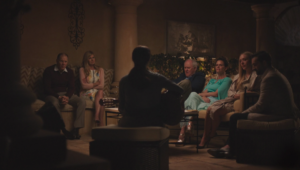
“There’s a great big beautiful tomorrow, shining at the end of everyday. There’s a great big beautiful tomorrow, and tomorrow’s just a dream away,” the Sherman Brothers wrote for Walt Disney’s Carousel of Progress in the 1964 New York World Fair, precisely where Tomorrowland drops the audience from the get-go. It’s no surprise that the tune above is used in Brad Bird’s new film mere minutes into it, as it undoubtedly signals the kind of message and vibe that the film is going for. As much of a future world as the title – and the actual Disneyland locale – might suggest, Tomorrowland is deeply rooted in an idealistic future that only someone from the past could have imagined.
It’s tough to offer up a synopsis of Bird’s latest without spoiling a lot of the fun that the film brings to the table, and the marketing itself has done a surprisingly solid job keeping it wrapped up. It bills George Clooney as the star, and so does the start of the film, with his younger self all bright-eyed and bushy-tailed in the aforementioned World Fair as he realizes there’s a world very unlike his own out there. But this story only offers an ounce of background for the true journey the audience embarks on, as the film comfortably shifts gears into the modern world and presents one with the incredibly optimistic protagonist Casey Newton (Britt Robertson).
And her optimism mirrors what Bird and co-writers Damon Lindelof & Jeff Jensen are offering up minute after minute in Tomorrowland. It’s a narrative that presents a bleak situation and counters it with an ounce of hope; not exactly anything new to write home about, but they have no qualms with that. There’s no need to be subtle with this kind of story, and in an amusing barrage of scenes that showcase Casey’s thirst for a bright future, she’s faced by teacher after teacher discussing just how awful our universe is and even how it was predicted by dystopian literature of the past. It’s so on-the-nose, but when mounting a film whose sensibilities are similar to that of Disney’s in the “good-ol’ days”, it feels right at home. And when the sci-fi of it all kicks off, and Michael Giacchino’s energetic score sweeps into the room, she’s just as bewildered by her situation as the audience is, but her charisma – and the fact that Tomorrowland is entirely earnest about its message – is exactly what makes the movie such a compelling watch, even when it flies off the rails.
There’s no denying that no one could have made a film like Bird did back in the sixties. He takes advantage of all the special effects in the world, most of the time for better (and occasionally worse), and indulges in creating wildly creative set pieces for time-travel, laser-gun fights, and jetpack flying. The presentation of many of these moments feels directly inspired by the filmmaker’s career in animation, with the cartoonish aspects turned up to eleven within a live-action universe. This most notably shows up in scenes with Kathryn Hahn & Keegan-Michael Key, who play androids like no other human beings likely ever could, along with the cavalcade of constantly smiling men – who resemble animatronics more than anything else – trying to stop Casey and co on their journey to saving the world.
Interestingly enough though, there’s little to no difference in the aesthetic nature of how every different period, or “world”, is presented. It all flows so naturally between the World Fair in the sixties, Tomorrowland at its finest and most futuristic (clearly boasting the most fascinating production design in the film), a modern world that seems as plain as ever, and a futuristic society left to decay with no hope left in sight. The shifts between two of these, in fact, offer up one of the film’s most entertaining series of gags for a minor portion. As Casey touches Disney’s Tomorrowland pin1, she pops into another world while still existing in her very own (as the teasers so kindly show – so no spoilers here). As such, while she moves through the futuristic society, she finds herself bumping into all manner of objects in her own world and even falling down the stairs.
Practically everything mentioned is the stuff that proves Robertson an actress immensely capable of playing up the physical (and verbal) comedy that the film requires, but she tunes into the genuine emotion that the film so longs to deliver more often than one would ever expect. Because of this, Casey ends up being one of the coolest teenage heroines to hit screens in a long time, outshining everyone around her even when the story isn’t quite so focused on her. The fact that she has the same mesmerizing facial features as Fringe‘s Anna Torv and charisma as Jennifer Lawrence only makes her case all the stronger. But even though Tomorrowland wishes it was a little more thrilling, more emotional, more intelligent – or, more everything – than it really is, it’s the kind of film that still manages to pull you in for a good time. With his latest, Brad Bird has crafted a well-meaning film whose heavy-handedness and flaws are easy to look over because of the fact that he, his characters, and everyone involved, sticks to their convictions through and through. And, boy, is it nice to see a movie that – regardless of being made by a cash-hungry company – emits the same kind of sincere and positive atmosphere I feel when I walk into that big beautiful theme park every time I visit.
—
1 Please buy me fifty of these pins. Thank you.
Directed by Brad Bird; written by Damon Lindelof, Brad Bird & Jeff Jensen; starring Britt Robertson, George Clooney, Hugh Laurie, Raffey Cassidy, Kathryn Hahn, Keegan-Michael Key, Tim McGray, Pierce Gagnon, and Thomas Robinson; 130 minutes.
Tomorrowland is now playing in theaters everywhere.



 Derek
Derek
 Isabelle
Isabelle